For the 2025 school year, there are 2 public elementary schools serving 825 students in Woodstown-Pilesgrove Regional School District. This district's average elementary testing ranking is 6/10, which is in the top 50% of public elementary schools in New Jersey.
Public Elementary Schools in Woodstown-Pilesgrove Regional School District have an average math proficiency score of 37% (versus the New Jersey public elementary school average of 37%), and reading proficiency score of 56% (versus the 49% statewide average).
Minority enrollment is 30% of the student body (majority Black), which is less than the New Jersey public elementary school average of 63% (majority Hispanic).
Overview
This School District
This State (NJ)
# Schools
4 Schools
1,930 Schools
# Students
1,475 Students
886,629 Students
# Teachers
132 Teachers
77,858 Teachers
Student : Teacher Ratio
11:1
11:1
District Rank
Woodstown-Pilesgrove Regional School District, which is ranked within the top 50% of all 646 school districts in New Jersey (based off of combined math and reading proficiency testing data) for the 2021-2022 school year.
The school district's graduation rate of 75-79% has decreased from 95% over five school years.
Overall District Rank
#307 out of 650 school districts
(Top 50%)
(Top 50%)
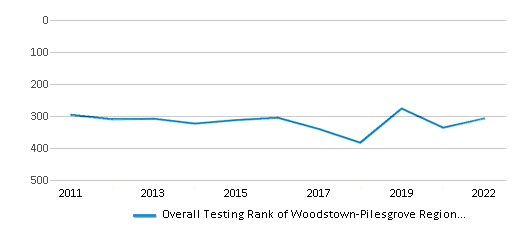
Math Test Scores (% Proficient)
36%
36%
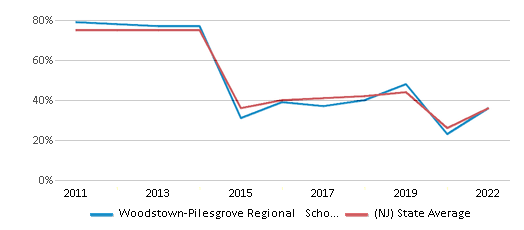
Reading/Language Arts Test Scores (% Proficient)
55%
49%
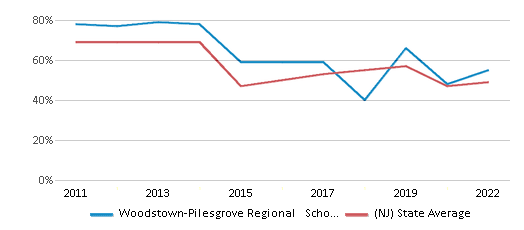
Science Test Scores (% Proficient)
22%
23%
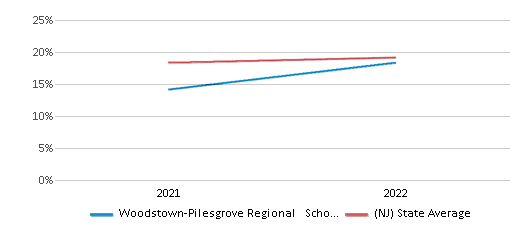
Graduation Rate
75-79%
85%
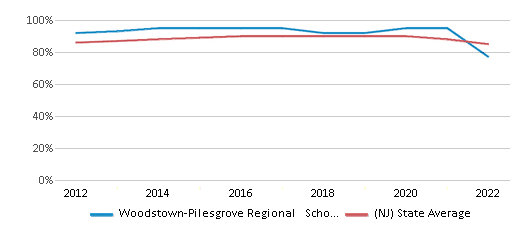
Students by Ethnicity:
Diversity Score
0.45
0.72
# American Indian Students
1 Student
1,992 Students
% American Indian Students
n/a
n/a
# Asian Students
18 Students
92,318 Students
% Asian Students
1%
10%
# Hispanic Students
147 Students
301,752 Students
% Hispanic Students
10%
34%
# Black Students
151 Students
132,335 Students
% Black Students
10%
15%
# White Students
1,074 Students
325,482 Students
% White Students
73%
37%
# Hawaiian Students
n/a
1,690 Students
% Hawaiian Students
n/a
n/a
# Two or more races Students
84 Students
30,907 Students
% of Two or more races Students
6%
4%
Students by Grade:
# Students in PK Grade:
113
41,362
# Students in K Grade:
72
85,425
# Students in 1st Grade:
87
93,943
# Students in 2nd Grade:
89
96,713
# Students in 3rd Grade:
87
95,865
# Students in 4th Grade:
99
97,373
# Students in 5th Grade:
105
98,202
# Students in 6th Grade:
96
99,575
# Students in 7th Grade:
95
80,278
# Students in 8th Grade:
95
80,823
# Students in 9th Grade:
119
4,713
# Students in 10th Grade:
162
4,047
# Students in 11th Grade:
133
3,770
# Students in 12th Grade:
123
4,350
# Ungraded Students:
-
190
District Revenue and Spending
The revenue/student of $21,043 in this school district is less than the state median of $26,931. The school district revenue/student has stayed relatively flat over four school years.
The school district's spending/student of $19,546 is less than the state median of $25,828. The school district spending/student has stayed relatively flat over four school years.
Total Revenue
$31 MM
$36,642 MM
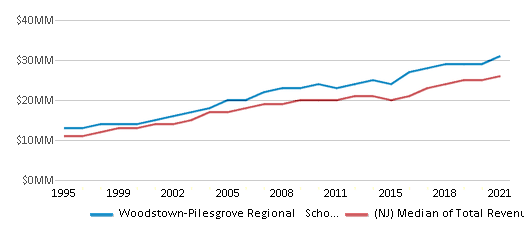
Spending
$29 MM
$35,142 MM
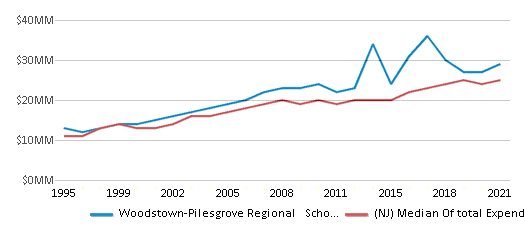
Revenue / Student
$21,043
$26,931
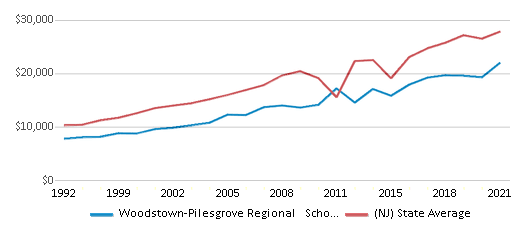
Spending / Student
$19,546
$25,828
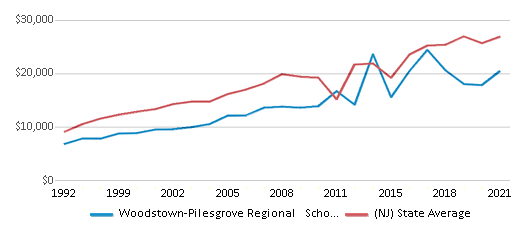
Best Woodstown-Pilesgrove Regional School District Public Elementary Schools (2025)
School
(Math and Reading Proficiency)
(Math and Reading Proficiency)
Location
Grades
Students
Rank: #11.
Mary S. Shoemaker School
(Math: 41% | Reading: 57%)
Rank:
Rank:
7/
Top 50%10
Mary S Shoemaker School, 201
Woodstown, NJ 08098
(856) 769-0144
Woodstown, NJ 08098
(856) 769-0144
Grades: K-5
| 539 students
Rank: #22.
Woodstown Middle School
(Math: 33% | Reading: 55%)
Rank:
Rank:
6/
Top 50%10
Woodstown Middle School, 15 Li
Woodstown, NJ 08098
(856) 769-0144
Woodstown, NJ 08098
(856) 769-0144
Grades: 6-8
| 286 students
Recent Articles

Year-Round Or Traditional Schedule?
Which is more appropriate for your child? A year-round attendance schedule or traditional schedule? We look at the pros and cons.

Why You Should Encourage Your Child to Join a Sports Team
Participating in team sports has a great many benefits for children, there is no doubt. In this article you will learn what those benefits are.

White Students are Now the Minority in U.S. Public Schools
Increasing birth rates among immigrant families from Asia and Central and South America, combined with lower birth rates among white families, means that for the first time in history, public school students in the United States are majority-minority. This shift in demographics poses difficulties for schools as they work to accommodate children of varying language abilities and socio-economic backgrounds.





